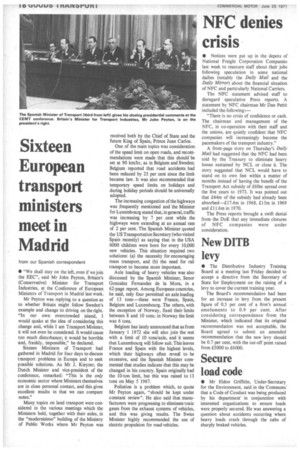Sixteen European transport ministers meet in Madrid
Page 20

If you've noticed an error in this article please click here to report it so we can fix it.
from our Spanish correspondent • "We shall stay on the left, even if we join the EEC", said Mr John Peyton, Britain's (Conservative) Minister for Transport Industries, at the Conference of European Ministers of Transport in Madrid last week.
Mr Peyton was replying to a question as to whether Britain might follow Sweden's example and change to driving on the right. "In our own overcrowded island, I would quake at the idea of considering this change and, while I am Transport Minister, it will not even be considered. It would cause too much disturbance; it would be horrible and, frankly, impossible," he declared.
Sixteen Ministers of Transport had gathered in Madrid for four days to discuss transport problems in Europe and to seek possible solutions. As Mr J. Kieyzer, the Dutch Minister and vice-president of the conference, remarked: "This is the only economic sector where Ministers themselves am in close personal contact, and this gives excellent results in that we can compare notes."
Many topics on land transport were considered in the various meetings which the Ministers held, together with their aides, in the "modernisimo" building of the Ministry of Public Works where Mr Peyton was received both by the Chief of State and the future King of Spain, Prince Juan Carlos.
One of the main topics was consideration. of the speed limit on open roads, and recommendations were made that this should be set at 90 km/hr, as in Belgium and Sweden; Belgium reported that road accidents had been reduced by 25 per cent since the limit became law. It was also recommended that temporary speed limits on holidays and during holiday periods should be universally adopted.
The increasing congestion of the highways was frequently mentioned and the Minister for Luxembourg stated that, in general, traffic was increasing by 7 per cent while the highways were extending at an annual rate of 2 per cent. The Spanish Minister quoted the US Transportation Secretary (who visited Spain recently) as saying that in the USA 6000 children were born for every 10,000 new vehicles. This situation required two solutions: (a) the necessity for encouraging mass transport, and (b) the need for rail transport to become more important.
Axle loading of heavy vehicles was also discussed by the Spanish Minister, Senor Gonzalez Fernandez de la Mora, in a 62-page report. Among European countries, he said, only four permitted an axle loading of 13 tons—these were France, Spain, Belgium and Luxembourg. The others, with the exception of Norway, fixed their limits between 8 and 10 tons; in Norway the limit was 6 tons.
Belgium has lately announced that as from January 1 1972 she will also join the rest with a limit of 10 tons/axle, and it seems that Luxembourg will follow suit. This leaves France and Spain with the highest levels, which their highways often revert' to be excessive, and the Spanish Minister commented that studies indicate that this may be changed in his country. Spain originally had the 10-ton limit, but this was raised to 13 tons on May 5 1967.
Pollution is a problem which, to quote Mr Peyton again, "should be kept under constant review". He also said that manufacturers were progressing to eliminate toxic gases from the exhaust systems of vehicles, and this was giving results. The Swiss Minister highly recommended the use of electric propulsion for road vehicles.




































































































